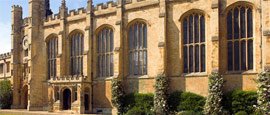Cambridge History
England’s foremost seat of learning alongside Oxford, Cambridge’s history is inextricably linked with its university. The first college, Peterhouse, was founded in 1284 by the Bishop of Ely, with royal patronage leading to the building of the renowned King’s College Chapel between 1441 and 1515.
Yet the history of this hallowed city dates back well before the creation of one of the world’s finest universities. The Romans settled north of the current city centre at Castle Hill and the city developed as a key trading post during Anglo–Saxon and Viking rule. It was during this time that Cambridge’s oldest building, St Bene't's Church, was constructed.
The original site of the Roman settlement at Castle Hill became the basis for a Norman castle built by William the Conqueror in 1068. Today, you can still see the mound on which this once imperious building would have stood, as well as the Church of the Holy Sepulchre, known as the Round Church, a classic example of Norman architecture.
It was in the late medieval period, however, that Cambridge’s modern status was assured, thanks to the arrival of Oxford scholars looking to set up colleges in the 13th century. The heavily fortified town played a major role in the English Civil War too, when one time Sidney Sussex College student Oliver Cromwell was granted control of Cambridge by Parliament. Royalist armies never penetrated the city’s walls and Cambridge remained loyal to the man who would become Lord Protector of England.
Cambridge’s population boomed in the 19th century thanks to the arrival of the railways in 1845, bringing people to the city and helping the distribution of crops across the country from the surrounding farm fields. Today the university still dominates the city’s skyline and owns much of the centre, its influence also felt on the edge of town in the growing science parks. Cambridge today is the UK’s leading research centre, its students and their skills clamoured over by the world’s biggest tech companies.
Did you know?
• No new colleges were opened in Cambridge between 1596 and 1800.
• Over 40% of Cambridge’s workforce have a higher education qualification, twice the UK national average.
• Cambridge was only granted city status in 1951 as it does not have a cathedral, a traditional prerequisite.
Do you have any Feedback about this page?
© 2026 Columbus Travel Media Ltd. All rights reserved. No part of this site may be reproduced without our written permission, click here for information on Columbus Content Solutions.




 You know where
You know where